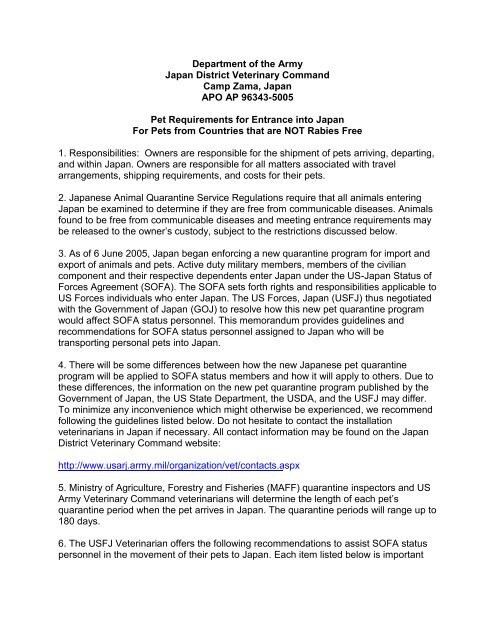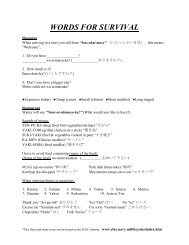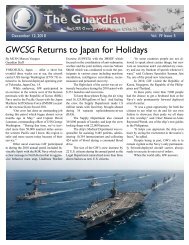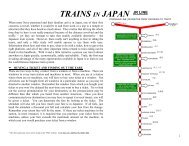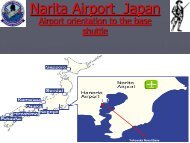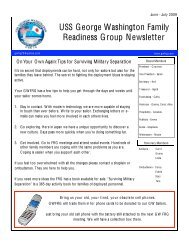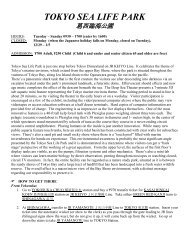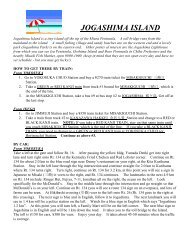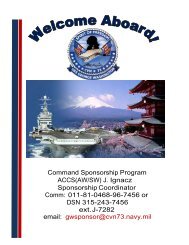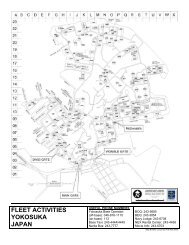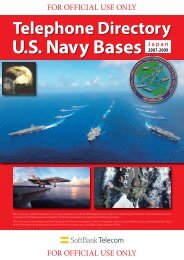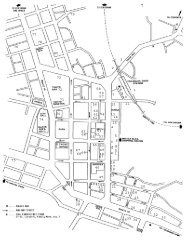Requirements for Pet Entrance
Requirements for Pet Entrance
Requirements for Pet Entrance
You also want an ePaper? Increase the reach of your titles
YUMPU automatically turns print PDFs into web optimized ePapers that Google loves.
Department of the Army<br />
Japan District Veterinary Command<br />
Camp Zama, Japan<br />
APO AP 96343-5005<br />
<strong>Pet</strong> <strong>Requirements</strong> <strong>for</strong> <strong>Entrance</strong> into Japan<br />
For <strong>Pet</strong>s from Countries that are NOT Rabies Free<br />
1. Responsibilities: Owners are responsible <strong>for</strong> the shipment of pets arriving, departing,<br />
and within Japan. Owners are responsible <strong>for</strong> all matters associated with travel<br />
arrangements, shipping requirements, and costs <strong>for</strong> their pets.<br />
2. Japanese Animal Quarantine Service Regulations require that all animals entering<br />
Japan be examined to determine if they are free from communicable diseases. Animals<br />
found to be free from communicable diseases and meeting entrance requirements may<br />
be released to the owner’s custody, subject to the restrictions discussed below.<br />
3. As of 6 June 2005, Japan began en<strong>for</strong>cing a new quarantine program <strong>for</strong> import and<br />
export of animals and pets. Active duty military members, members of the civilian<br />
component and their respective dependents enter Japan under the US-Japan Status of<br />
Forces Agreement (SOFA). The SOFA sets <strong>for</strong>th rights and responsibilities applicable to<br />
US Forces individuals who enter Japan. The US Forces, Japan (USFJ) thus negotiated<br />
with the Government of Japan (GOJ) to resolve how this new pet quarantine program<br />
would affect SOFA status personnel. This memorandum provides guidelines and<br />
recommendations <strong>for</strong> SOFA status personnel assigned to Japan who will be<br />
transporting personal pets into Japan.<br />
4. There will be some differences between how the new Japanese pet quarantine<br />
program will be applied to SOFA status members and how it will apply to others. Due to<br />
these differences, the in<strong>for</strong>mation on the new pet quarantine program published by the<br />
Government of Japan, the US State Department, the USDA, and the USFJ may differ.<br />
To minimize any inconvenience which might otherwise be experienced, we recommend<br />
following the guidelines listed below. Do not hesitate to contact the installation<br />
veterinarians in Japan if necessary. All contact in<strong>for</strong>mation may be found on the Japan<br />
District Veterinary Command website:<br />
http://www.usarj.army.mil/organization/vet/contacts.aspx<br />
5. Ministry of Agriculture, Forestry and Fisheries (MAFF) quarantine inspectors and US<br />
Army Veterinary Command veterinarians will determine the length of each pet’s<br />
quarantine period when the pet arrives in Japan. The quarantine periods will range up to<br />
180 days.<br />
6. The USFJ Veterinarian offers the following recommendations to assist SOFA status<br />
personnel in the movement of their pets to Japan. Each item listed below is important
and must be accomplished as soon as the military member is aware of movement to<br />
Japan. This will ease the transition and acceptance of the pets into Japan.<br />
a. Microchipping: Be<strong>for</strong>e completing any of the following requirements, PLEASE<br />
MICROCHIP YOUR PET FIRST. Any vaccinations or FAVN testing prior to<br />
microchipping will be considered invalid. All animals must obtain a microchip be<strong>for</strong>e<br />
arriving in Japan. ISO or ISO-compatible chips that meet the ISO 11784 and 11785<br />
Standard are recommended. HomeAgain® and AVID® microchips are acceptable. The<br />
identification number of the microchip must be annotated on the Rabies Certificate, the<br />
Health Certificate, and on the rabies serology (FAVN) test result sheet.<br />
b. Vaccinations: SOFA status personnel bringing a dog or cat into Japan must<br />
present documentary evidence that their pet has had at least two rabies vaccinations<br />
(INACTIVATED VACCINE) since being microchipped. The most recent inactivated<br />
rabies vaccination must have been given not less than 30 days and not later than 12<br />
months prior to arrival. The most recent rabies vaccination <strong>for</strong>m (DD 2208, Rabies<br />
Vaccination Certificate) will be required and requires annotation of the microchip<br />
number. Complete in<strong>for</strong>mation <strong>for</strong> the past two inactivated rabies vaccinations will be<br />
annotated on the health certificate (MDJ OP 2209, Veterinary Health Certificate <strong>for</strong><br />
Import/Export <strong>for</strong> Japan). The first inactivated rabies vaccine may be given at the same<br />
time as the microchip. The second inactivated rabies vaccine booster should be given at<br />
least 32 days or more after the first rabies immunization.<br />
c. Fluorescent Antibody Viral Neutralization (FAVN) Test: This blood test needs<br />
to be per<strong>for</strong>med after the second rabies and is good <strong>for</strong> up to 2 years. For PUPPIES &<br />
KITTENS (< 12 months): Blood should be drawn > 30 days after the second rabies<br />
vaccine. For ADULT DOGS & CATS (> 12 months with a history of rabies vaccinations):<br />
Blood can be drawn within 2 days or later of the second rabies immunization. A FAVN<br />
test result which indicates an antibody level greater than or equal to 0.5 IU/ml is<br />
acceptable. The microchip number needs to be annotated on the FAVN test result <strong>for</strong>m.<br />
The FAVN blood test can be per<strong>for</strong>med at Kansas State University Rabies Laboratory<br />
or DOD Veterinary Food Analysis and Diagnostic Laboratory, Fort Sam Houston, TX.<br />
d. Advance Notification: Kadena AB and Yokota AB currently have capabilities<br />
<strong>for</strong> handling AMC arrivals of dogs and cats so the advance notification is not needed. If<br />
the animal is traveling by commercial air, the Government of Japan requires an advance<br />
notification of pet movement as soon as transportation is scheduled. A notification of<br />
approval will be returned and is used when checking the animal in with the airline.<br />
There<strong>for</strong>e, in order to avoid problems at check-in with the airline, this prior notification<br />
approval <strong>for</strong>m is very important. Please annotate in the “Remarks” box on the Advance<br />
Notification Form the following statement: “This pet belongs to a US SOFA sponsored<br />
family and will be assigned to (list installation).”<br />
The advance notification <strong>for</strong>m is found on the JDVC website:<br />
http://www.usarj.army.mil/organization/vet/r_doc.aspx
The advance notification <strong>for</strong>m is required to be sent by mail or FAX to the port of entry.<br />
Addresses and FAX numbers <strong>for</strong> the respective ports of entry may be found at this<br />
website:<br />
http://www.maff.go.jp/aqs/english/contactus.html<br />
All incoming animals must enter Japan through officially designated ports:<br />
i) Seaports: Keihin, Nagoya, Osaka, Kobe, Kanmon, and Naha.<br />
ii) Airports: New Tokyo (Narita), Tokyo (Haneda), Nagoya,<br />
Osaka (Kansai), Fukuoka, Kagoshima, and Naha (Okinawa).<br />
iii) Military AMC ports: Kadena AB and Yokota AB.<br />
e. Health Certificate: An individual health certificate is required <strong>for</strong> each animal<br />
that is moved into or out of Japan. The military health certificate is valid <strong>for</strong> 10 days and<br />
must be completed within 10 days be<strong>for</strong>e arrival. Please note that the traveler will lose<br />
one day during travel to Japan from the US. The MDJ OP Form 2209 (Veterinary Health<br />
Certificate <strong>for</strong> Import/Export <strong>for</strong> Japan) may be used by military veterinarians. The MDJ<br />
OP Form 2209 may be found on the Japan District Veterinary Command homepage:<br />
http://www.usarj.army.mil/organization/vet/r_doc.aspx<br />
f. USDA Certification: If a health certificate is issued by a licensed civilian<br />
veterinarian, the health certificate and rabies certificate must be certified by a USDA<br />
Federal Veterinarian ( http://www.aphis.usda.gov/animal_health/area_offices ) and bear<br />
the USDA raised embossed seal. These USDA certified health certificates are valid up<br />
to 30 days be<strong>for</strong>e arrival. The airlines require a health certificate that is within 10 days of<br />
arrival. There<strong>for</strong>e if the USDA certified health certificate isn’t dated within 10 days of<br />
arrival, an additional certificate will be required within 10 days of arrival <strong>for</strong> the airline.<br />
The certified certificate will be used upon arrival <strong>for</strong> processing the pet at Customs.<br />
Health certificates issued by a military veterinary treatment facility using the MDJ OP<br />
Form 2209 do not require the USDA certification.<br />
g. Age Requirement: Japan discourages the importation of dogs and cats under<br />
the age of 12 months. These pets rarely meet the vaccination and FAVN test<br />
requirements prior to 11 months. <strong>Pet</strong>s under the age of 11 months can be imported but<br />
must start out with a 180 day quarantine period. This quarantine period may be reduced<br />
as all of the steps above are completed be<strong>for</strong>e arrival in Japan. Primary emphasis is<br />
placed on microchipping, rabies vaccinations (one at 91 days of age followed by a<br />
second one at least 30 days after the first), and the FAVN test (must be drawn at least<br />
30 days after the second rabies vaccination). For animals over the age of 12 months<br />
with a history of vaccination, the primary difference is the FAVN test may be per<strong>for</strong>med<br />
anytime after the second rabies vaccination.
h. Official Travel Orders (2 copies): <strong>Pet</strong> owners must submit Official Travel<br />
Orders upon arrival to the Animal Quarantine Service in the Customs area to verify<br />
SOFA status.<br />
i. MDJ Form 270 (<strong>Pet</strong> Quarantine and Examination Certificate; 2 copies): All<br />
SOFA status personnel entering Japan with a pet are required to complete a MDJ 270.<br />
The MDJ 270 allows your pet to be released to you <strong>for</strong> transportation to your US Military<br />
Quarantine Facility. The <strong>for</strong>m may be downloaded from the JDVC website and should<br />
be completed prior to arrival in Japan. You are required to submit the <strong>for</strong>m to the Animal<br />
Quarantine Officer at arrival, then to your US Military Veterinary Treatment Facility<br />
within 72 hours after entry into Japan to continue and complete the quarantine process.<br />
j. USFJ Form 380 EJ (Customs Free Import or Export of Cargo or Customs<br />
Declaration of Personal Property): This <strong>for</strong>m is needed when your pet(s) enters Japan<br />
unaccompanied as cargo or on a different flight as the sponsor. You do not need this<br />
<strong>for</strong>m if you are accompanying the animal as baggage. You can only use this <strong>for</strong>m within<br />
6 months of PCSing to Japan. After 6 months, you can still use the <strong>for</strong>m, but you may<br />
be required to pay any custom’s duties associated with bringing a pet into country. You<br />
may obtain the <strong>for</strong>m by having your sponsor take a copy of your orders to the<br />
transportation office at your gaining command. The base transportation officer will sign<br />
the appropriate box after verifying your orders.<br />
k. <strong>Pet</strong> owners or their authorized representatives should be prepared to provide<br />
the following in<strong>for</strong>mation to the Animal Quarantine Officer:<br />
i) Military Mailing Address<br />
ii) Duty Phone Number (Ask your sponsor <strong>for</strong> a duty number)<br />
iii) Command In<strong>for</strong>mation<br />
NOTE: Placing the above certificates in a zip lock plastic bag and taping it securely on<br />
top of the pet’s cage seems to work best. These <strong>for</strong>ms must accompany the animal<br />
during transit. Ensure these <strong>for</strong>ms are completely filled out and it is suggested that you<br />
carry in your possession the originals of each certificate. When clearing customs, all<br />
supporting documentation, including the animal’s health record, needs to be available<br />
<strong>for</strong> referencing in case of any questions concerning the health and identity of the animal<br />
and validity of the records.<br />
7. Quarantine Period: The quarantine period is primarily determined by the date when<br />
the blood <strong>for</strong> the FAVN test was collected. This is only valid if the microchip was<br />
received prior to the two inactivated rabies vaccinations and the inactivated rabies<br />
immunizations were received prior to the blood being drawn <strong>for</strong> the FAVN test. The<br />
FAVN test result level must be ≥ 0.5 IU/ml.<br />
Equation used:<br />
(180 days) minus (# days since blood <strong>for</strong> FAVN test received by an acceptable<br />
laboratory from the date of arrival) = # of quarantine days assigned.
The earlier that the pet meets the microchip, two vaccinations, and FAVN test standards,<br />
the shorter will be the assigned quarantine period (up to 180 days). Those pets that<br />
arrive with a FAVN test ≥ 180 days and < 2 years will be allowed to be released directly<br />
into the custody of the owners without a quarantine time period assessed.<br />
When the animal reports to the Military Veterinary Treatment Facility within 72 hours<br />
after arrival, the MDJ Form 270 will be completed by the Military Veterinarian and the<br />
quarantine process will be complete. Quarantine length is also assessed by the<br />
sequential order and completion of all previous steps, the accuracy and the completion<br />
of all paperwork, pet identification and documentation, including Health Certificates,<br />
Rabies Certificates, USDA certification (if required), and Advance Notification Approval.<br />
Any fault found in any of these areas will result in an automatic 180 day quarantine<br />
period. However, military Veterinarians are able to reassess and correct quarantine<br />
periods that are associated with some paperwork mistakes.<br />
a. Home Quarantine: SOFA status personnel will be allowed to quarantine their<br />
animals in on-base housing only. Those pets that are assessed quarantine can<br />
complete it in the owner’s home on base.<br />
b. Kennel Quarantine: Those pets that do not meet the entry requirements or<br />
SOFA status personnel that are required to live in off-base housing must quarantine<br />
their animal(s) at the owner’s expense in a quarantine facility. Military quarantine<br />
facilities are available but limited in boarding space. Please secure kenneling<br />
reservations ahead of time. If space is not available, the quarantine period will need to<br />
be completed at a designated airport Japanese Animal Quarantine Station. See<br />
website:<br />
http://www.maff.go.jp/aqs/english/contactus.html<br />
c. SPECIAL NOTE: The practice of allowing pets to remain in the custody of<br />
their owners during the assigned "home quarantine" period is a privilege and is not<br />
obligatory upon Japanese authorities. There<strong>for</strong>e, it is imperative that U.S. Forces pet<br />
owners cooperate and comply fully with Japanese Quarantine Laws and military<br />
regulations pertaining to the requirements <strong>for</strong> examining or otherwise processing<br />
animals <strong>for</strong> entry into or exit from Japan. Failure to present the animal to a Veterinary<br />
Treatment Facility (VTF) <strong>for</strong> the final physical examination is a serious violation of the<br />
Japanese law and may result in a fine or other punishment. Failure to comply with the<br />
requirements <strong>for</strong> final physical examination will result in a report of the incident being<br />
<strong>for</strong>warded to the individual’s command.<br />
8. All <strong>for</strong>ms and in<strong>for</strong>mation may be found at the Japan District Veterinary Command<br />
webpage:<br />
http://www.usarj.army.mil/organization/vet/index.htm<br />
All contact in<strong>for</strong>mation to include phone, email, and FAX in<strong>for</strong>mation is also found at the<br />
JDVC website. A pet process checklist is also available to assist clients and
veterinarians in completing all requirements in a timely manner. Any other questions<br />
may be <strong>for</strong>warded to the respective Branch Chief or to Commander, JDVC.<br />
9. Quarantine Facilities: The pet owner is responsible <strong>for</strong> all expenses associated with<br />
all quarantine procedures, to include the transportation procurement actions to and from<br />
any quarantine inspection facilities of the Japanese Animal Quarantine Service or of the<br />
U.S. Armed Forces.<br />
AREA<br />
RESPONSIBLE<br />
QUARANTINE FACILITY<br />
TELEPHONE<br />
NUMBER (DSN)<br />
COST PER DAY<br />
($)*<br />
Atsugi<br />
Komiseya Housing Area<br />
(Boarding)<br />
265-8389<br />
Cat--10.00<br />
Dog--15.00<br />
Iwakuni<br />
Iwakuni MCAS<br />
(VTF)<br />
253-3588<br />
Cat--10.00<br />
Dog--15.00<br />
Misawa<br />
Misawa AFB<br />
(PAWS)<br />
222-7002<br />
Cat--10.00<br />
Dog--10.00<br />
Okinawa<br />
Sasebo<br />
Kadena AFB<br />
(Boarding)<br />
Sasebo NB<br />
(Boarding)<br />
098-959-1609 Cat--15.00<br />
Dog--17.50<br />
252-2905<br />
Cat--10.00 - 15.00<br />
Dog--15.00 - 25.00<br />
Yokosuka<br />
Yokosuka NB<br />
(Boarding)<br />
243-4530<br />
Cat--12.50<br />
Dog--12.50 - 18.50<br />
Yokota<br />
Yokota AFB<br />
(Boarding)<br />
225-8906<br />
Cat--10.00<br />
Dog--12.00<br />
Zama<br />
Camp Zama<br />
(Boarding)<br />
263-5915<br />
Cat--10.00<br />
Dog--15.00<br />
*Additional charges may apply. These prices are current as of 1 JAN 2009. Some<br />
facilities offer group rates and extended boarding discounts. All prices are subject to<br />
change. Please contact the facility <strong>for</strong> these discounts and applied rates.<br />
9. <strong>Pet</strong> Quarantine Reimbursement<br />
a. Service Members:<br />
i) Mandatory pet quarantine fees incurred by U.S. service members in<br />
connection with the mandatory quarantine of a household pet are<br />
reimbursable not to exceed $550 per PCS move <strong>for</strong> pets in, or entering<br />
into, quarantine on and after 28 DEC 2001. (Ref. JFTR, par. U5805.)<br />
ii) Transportation cost, medical care, grooming, and similar fees <strong>for</strong><br />
services that are part of routine pet care associated with a PCS are not<br />
reimbursable. Similarly, boarding cost incurred after the final release dates
from quarantine are not reimbursable. For example, if on the day the<br />
attending veterinarian certifies the pet has completed the quarantine<br />
period and the service member cannot take possession of the pet <strong>for</strong> any<br />
reason (i.e., the service member is TDY or pets are not allowed in<br />
billeting), the reimbursable amount is set on that date. All subsequent<br />
boarding cost(s) are not reimbursable.<br />
iii) Documents recommended to submit to finance include:<br />
1. Boarding receipt <strong>for</strong> mandatory quarantine dates<br />
2. Copy of MDJ Form 270 with entry date and final release date<br />
from quarantine<br />
b. DOD Civilian Employees:<br />
i) <strong>Pet</strong> quarantine fees and transportation charges incurredin connection<br />
with a PCS are included in the Miscellaneous Expense Allowance (MEA)<br />
applicable fixed amount (Ref. JTR, par. C5310-D). If MEA expenses are<br />
itemized, reimbursement <strong>for</strong> those expenses, including pet quarantine<br />
fees and transportation charges, is allowed up to the applicable maximum<br />
amount ($500 to $1,000) authorized in JTR, par. C5310-B.<br />
ii) Documents recommended to submit to finance include:<br />
1. Boarding receipt <strong>for</strong> mandatory quarantine dates<br />
2. Copy of MDJ Form 270 with entry date and final release date<br />
from quarantine<br />
10. Upon arrival at sponsor’s assigned duty station:<br />
a. <strong>Pet</strong> owners must contact the US Army Veterinary Treatment Facility (VTF)<br />
located at the closest installation (see below) within 72 hours of arrival. The final<br />
examination must be conducted within 72 hours from the end of the quarantine period.<br />
b. The pet owner is responsible <strong>for</strong> transporting the animal to and from the VTF<br />
and <strong>for</strong> any expenses incurred.<br />
c. SPECICAL NOTE: The practice of allowing pets to remain in the custody of<br />
their owners during the assigned “home quarantine” period is a privilege and is not<br />
obligatory upon the Japanese authorities. There<strong>for</strong>e, it is imperative that U.S. Forces<br />
pet owners cooperate and comply fully with Japanese Quarantine Laws and military<br />
regulations pertaining to the requirements <strong>for</strong> examining or otherwise processing<br />
animals <strong>for</strong> entry into or exit from Japan. Failure to present the animal(s) to a VTF <strong>for</strong><br />
the final physical examination is a serious violation of Japanese law and may result in a<br />
fine or other punishment. Failure to comply with the requirements <strong>for</strong> final physical<br />
examination will result in a report of the incident being <strong>for</strong>warded to the individual’s<br />
command.
AREA<br />
RESPONSIBLE VETERINARY<br />
TREATMENT FACILITY (VTF)<br />
TELEPHONE<br />
NUMBER (DSN)<br />
Atsugi Zama VTF 263-3875<br />
Iwakuni Iwakuni VTF 253-3588<br />
Misawa Misawa VTF 226-4502<br />
Okinawa Kadena VTF 098-959-1300<br />
Sasebo Sasebo VTF 252-3585<br />
Yokosuka Yokosuka VTF 243-6820<br />
Yokota Yokota VTF 225-4363<br />
Zama Zama VTF 263-3875<br />
ADDITIONAL INFORMATION<br />
OVERVIEW - The Japan District Veterinary Command provides medical care <strong>for</strong> pets of<br />
authorized personnel throughout Japan. The primary missions of the respective<br />
Veterinary Units in Japan are food safety and quality assurance, public health concerns,<br />
veterinary care <strong>for</strong> military working dogs and privately owned pets.<br />
AUTHORIZATION FOR SERVICES - Veterinary services are authorized <strong>for</strong> animals<br />
owned by persons with DOD medical care privileges. A valid SOFA-status identification<br />
card is required be<strong>for</strong>e services are rendered. Regulations also mandate that all pets<br />
are currently microchipped and vaccinated annually against rabies be<strong>for</strong>e services are<br />
rendered. This policy will be en<strong>for</strong>ced.<br />
DISCLAIMER - The Japan District Veterinary Command is authorized to provide care to<br />
your privately owned pet(s) as time, space, and personnel resources permit. Care <strong>for</strong><br />
privately owned animals is just one of many missions we per<strong>for</strong>m; there<strong>for</strong>e, we cannot<br />
guarantee that veterinary services will always be available. You must be prepared to<br />
seek veterinary care from local civilian veterinarians if necessary. You may obtain a<br />
written list of local veterinary clinics from the VTF. We recommend you obtain this list<br />
and become familiar with clinics in your area be<strong>for</strong>e the need arises.<br />
For more in<strong>for</strong>mation, please visit our web site:<br />
http://www.usarj.army.mil/organization/vet


